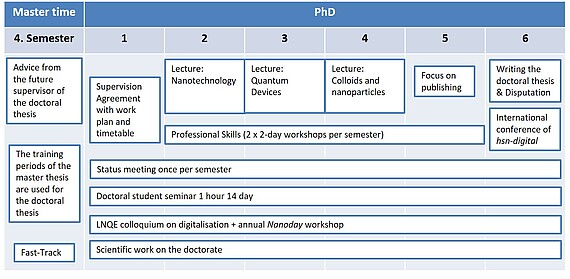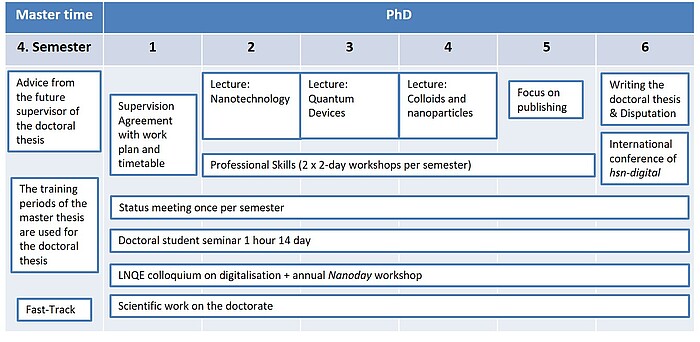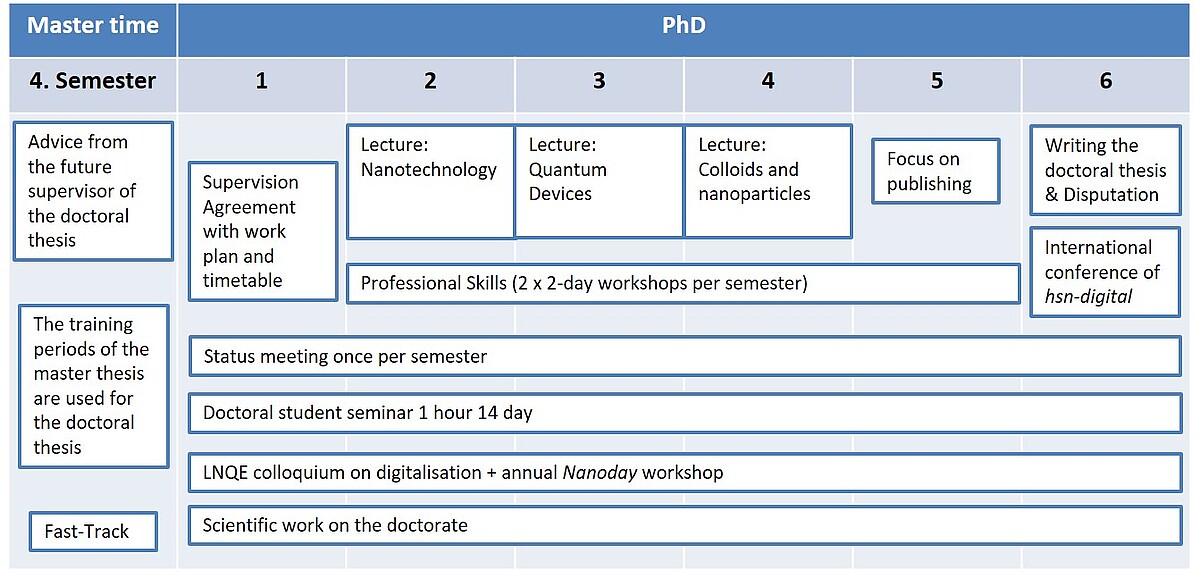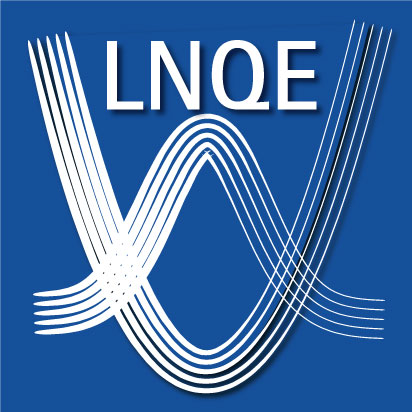Curriculum hsn-digital



Courses and Content
The language of the doctoral program is English
Supervision Agreement
At the very beginning of the PhD, the doctoral students must enroll as a PhD student in the Leibniz Universität Hannover. They must sign their doctoral project at the Faculty of the main supervisor. To this end, they have to make a supervision agreement with the entire supervision team; the supervision agreement includes a work plan and timetable on the doctoral project.
Lecture "Quantum Devices"
Selected topics of modern physics: quantum effects in semiconductor structures, physics of two-dimensional electron gases, graphs, quantum wires, quantum dots, coherence and alternating effects, single electron tunnel transistor, quantum computing.
Lecture "Nanotechnology"
This lecture gives an introduction to the basics of nanotechnology. Current and future methods of manufacturing and characterizing nanostructures are presented. The possibilities and limits of such methods in basic research and industrial application will be discussed.
Lecture „Colloids and Nanoparticles“
The lecture from physical chemistry gives a broad overview of particles on the nanometer scale with the topics: Tyndall effect, coalescence, aggregation, Ostwald ripening, DLVO theory, Zeta potential, Kelvin equation, surface energy, Young-Laplace equation, micelles, thixotropy, Brownian motion, self-diffusion, foams, liquid crystals, analysis of colloidal systems, generation, Stabilization and deposition of nanoparticles, Langmuir Blodgett technique, CVD, PVD, electroplating etc.
Professionell Skills
These two-day block courses convey the nowadays increasingly important "soft skills". The topics are determined in consultation with the doctoral students. The Graduate Academy then finds suitable lecturers and cares about the contractual details. This ensures that the lectures of hsn workshops consistently have a very high quality. The workshops will be evaluated by the doctoral students right at the end of the workshops.
PhD student’s seminar (1 hours 14-day during the semester)
Seminar by hsn-digital, here the doctoral students present each other's projects and scientific methods, and discuss possible links and solutions. The seminar serves also to practice the presentation skills gained in the workshops in front of a small audience. The organization of the seminar is entirely on the side of the doctoral candidates. They can also invite guests such professors who share their scientific career, or entrepreneurs and industry representatives for an insight into the economy.
LNQE-Colloquium on Digitalisation
The LNQE colloquium regularly features lectures by top-class guest speakers. For hsn-digital the lecture programme will be specifically geared to the topic of digitisation in order to with all aspects of digitization, such as Big Data, digital data analysis, artificial Intelligence and Internet of Things. Following the colloquium there will be a Get-Together, which provides the opportunity for an intensive exchange between the doctoral students and offers the guest lecturers.
NanoDay
A one-day workshop of LNQE with presentations and poster sessions. All contributions come from the working groups of LNQE and show the wide range of research in the field of nanotechnology in Hannover. The NanoDay serves for exchange of information and better knowledge of all working groups among themselves.
International conference of hsn-digital
At the end of the program, a two-day international conference with invited top international scientists and young researchers is planned. The conference will increase the international visibility of the doctoral program and support the networking of doctoral students.
Status Meetings
Once per semester, all doctoral students and all supervisors meet in one-day status meetings, where reports on the state of individual theses are given. This creates a strong exchange between projects and at the same place a quality assurance of the entire program. The program consists of short presentations and a poster session. All doctoral candidates must contribute with a talk or poster. On the status of meeting the annual general meeting will be held with all stakeholders of hsn-digital.
Focus on publishing
Towards the end of the doctorate, the teaching programme is deliberately reduced in order to have more time for publishing the researched results.
Dissertation, Thesis and Defense
The actual scientific dissertation on a topic of nanosensors (laboratory activities, research, measurements and evaluations, write publications, participation in workshops and conferences, etc.) is the central point of the program. At the end of the PhD project are the thesis and the defense of the work.






